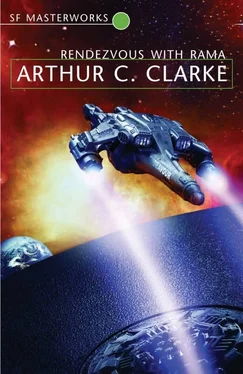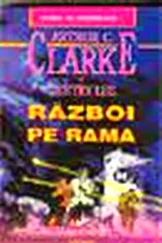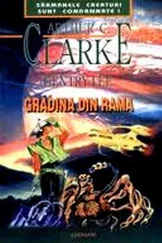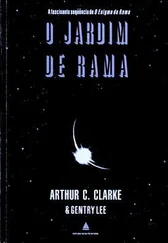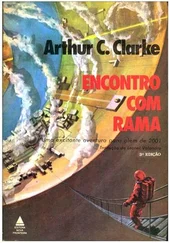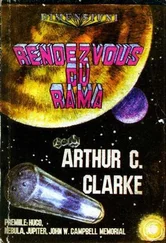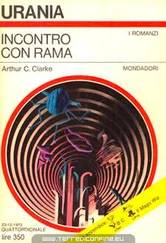Yet at the same time, he was glad that some decisions could be delegated to Earth. Now that Endeavour’s orbit had coalesced with Rama’s they were heading sunwards like a single body; in forty days they would reach perihelion, and pass within twenty million kilometres of the sun. That was far too close for comfort; long before then, Endeavour would have to use her remaining fuel to nudge herself into a safer orbit. They would have perhaps three weeks of exploring time, before they parted from Rama for ever.
After that, the problem would be Earth’s. Endeavour would be virtually helpless, speeding on an orbit which could make her the first ship to reach the stars—in approximately fifty thousand years. There was no need to worry, Mission Control had promised. Somehow, regardless of cost, Endeavour would be refuelled—even if it proved necessary to send tankers after her, and abandon them in space once they had transferred every gram of propellant. Rama was a prize worth any risk, short of a suicide mission.
And, of course, it might even come to that. Commander Norton had no illusions on this score. For the first time in a hundred years an element of total uncertainty had entered human affairs. Uncertainty was one thing that neither scientists nor politicians could tolerate. If that was the price of resolving it, Endeavour and her crew would be expendable.
Rama was as silent as a tomb—which, perhaps, it was. No radio signals, on any frequency; no vibrations that the seismographs could pick up, apart from the micro-tremors undoubtedly caused by the sun’s increasing heat; no electrical currents; no radioactivity. It was almost ominously quiet; one might have expected that even an asteroid would be noisier.
What did we expect? Norton asked himself. A committee of welcome? He was not sure whether to be disappointed or relieved. The initiative, at any rate, appeared up to him.
His orders were to wait for twenty-four hours, then to go out and explore. Nobody slept much that first day; even the crew members not on duty spent their time monitoring the ineffectually probing instruments, or simply looking out of the observation ports at the starkly geometrical landscape. Is this world alive? they asked themselves, over and over again. Is it dead? Or is it merely sleeping? On the first EVA, Norton took only one companion—Lieutenant Commander Karl Mercer, his tough and resourceful life-support officer. He had no intention of getting out of sight of the ship, and if there was any trouble, it was unlikely that a larger party would be safe. As a precaution, however, he had two more crew members, already suited up, standing by in the airlock.
The few grams of weight that Rama’s combined gravitational and centrifugal fields gave them were neither help nor hindrance; they had to rely entirely on their jets. As soon as possible, Norton told himself, he would string a cat’s-cradle of guide ropes between the ship and the pillboxes, so that they could move around without wasting propellants. The nearest pillbox was only ten metres from the airlock, and Norton’s first concern was to check that the contact had caused no damage to the ship. Endeavour’s hull was resting against the curving wall with a thrust of several tons, but the pressure was evenly distributed. Reassured, he began to drift around the circular structure, trying to determine its purpose. Norton had travelled only a few metres when he came across an interruption in the smooth, apparently metallic wall. At first, he thought it was some peculiar decoration, for it seemed to serve no useful function. Six radial grooves, or slots, were deeply recessed in the metal, and lying in them were six crossed bars like the spokes of a rimless wheel, with a small hub at the centre. But there was no way in which the wheel could be turned, as it was embedded in the wall. Then he noticed, with growing excitement, that there were deeper recesses at the ends of the spokes, nicely shaped to accept a clutching hand (claw? tentacle?). If one stood so, bracing against the wall, and pulled on the spoke so…
Smooth as silk, the wheel slid out of the wall. To his utter astonishment—for he had been virtually certain that any moving parts would have become vacuum-welded ages ago—Norton found himself holding a spoked wheel. He might have been the captain of some old windjammer standing at the helm of his ship. He was glad that his helmet sunshade did not allow Mercer to read his expression. He was startled, but also angry with himself; perhaps he had already made his first mistake. Were alarms now sounding inside Rama, and had his thoughtless action already triggered some implacable mechanism?
But Endeavour reported no change; its sensors still detected nothing but faint thermal crepitations and his own movements.
“Well, Skipper—are you going to turn it?”
Norton thought once more of his instructions. “Use your own discretion, but proceed with caution.” If he checked every single move with Mission Control, he would never get anywhere.
“What’s your diagnosis, Karl?” he asked Mercer. “It’s obviously a manual control for an airlock—probably an emergency back-up system in case of power failure. I can’t imagine any technology, however advanced, that wouldn’t take such precautions.”
“ And it would be fail-safe,” Norton told himself. “I t could only be operated if there was no possible danger to the system… ”
He grasped two opposing spokes of the windlass, braced his feet against the ground, and tested the wheel. It did not budge.
“Give me a hand,” he asked Mercer. Each took a spoke; exerting their utmost strength, they were unable to produce the slightest movement. Of course, there was no reason to suppose that clocks and corkscrews on Rama turned in the same direction as they did on Earth…
“Let’s try the other way,” suggested Mercer. This time, there was no resistance. The wheel rotated almost effortlessly through a full circle. Then, very smoothly, it took up the load. Half a metre away, the curving wall of the pillbox started to move, like a slowly opening clamshell. A few particles of dust, driven by wisps of escaping air, streamed outwards like dazzling diamonds as the brilliant sunlight caught them.
The road to Rama lay open.
It had been a serious mistake, Dr. Bose often thought, to put the United Planets Headquarters on the Moon. Inevitably, Earth tended to dominate the proceedings—as it dominated the landscape beyond the dome. If they had to build here, perhaps they should have gone to the Farside, where that hypnotic disc never shed its rays… But, of course, it was much too late to change, and in any case there was no real alternative. Whether the colonies liked it or not, Earth would be the cultural and economic overlord of the solar system for centuries to come.
Dr. Bose had been born on Earth, and had not emigrated to Mars until he was thirty, so he felt that he could view the political situation fairly dispassionately. He knew now that he would never return to his home planet, even though it was only five hours away by shuttle. At 115, he was in perfect health, but he could not face the reconditioning needed to accustom him to three times the gravity he had enjoyed for most of his life. He was exiled for ever from the world of his birth; not being a sentimental man, this had never depressed him unduly.
What did depress him sometimes was the need for dealing, year after year, with the same familiar faces. The marvels of medicine were all very well, and certainly he had no desire to put back the clock—but there were men around this conference table with whom he had worked for more than half a century. He knew exactly what they would say and how they would vote on any given subject. He wished that, some day, one of them would do something totally unexpected—even something quite crazy.
Читать дальше
